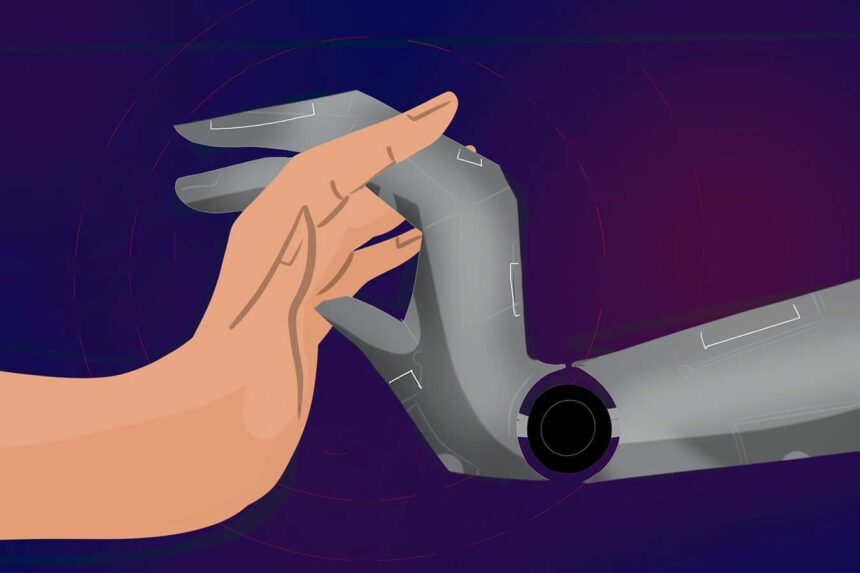
Feedback is New Scientist’s popular sideways look at the latest science and technology news. You can submit items you believe may amuse readers to Feedback by emailing feedback@newscientist.com
Electric dreams
Recently, Feedback was delighted to peruse the raciest conference invitation we have ever received. We get a lot of conference invites from organisers labouring under the delusion we are doing something akin to science journalism, and they are mostly a little prosaic: what’s new in G-protein signalling, more findings about the biology of molluscs, that kind of thing. But not this one, about an upcoming event in Shaoxing, China.
Here is the opening line: “From its groundbreaking inception in London to its spectacular evolution in the vibrant heart of China, the Love and Sex with Robots Conference is gearing up for its most thrilling chapters yet: its landmark 12th International edition, scheduled for June 2026.”
Before you start to imagine a sort of cybernetic Sodom and Gomorrah, remember: this is an academic conference, albeit one with TED Talk levels of hype. We are told to “prepare for a dazzling convergence of visionary scientists, renowned researchers, and revolutionary thinkers who are redefining human intimacy through cutting-edge robotics and AI”. Furthermore, “attendees will experience mind-blowing revelations, groundbreaking demonstrations, and provocative discussions that boldly explore the future of love, companionship, and technology”.
Elsewhere, the invite describes the conference as an “electrifying event”: we trust not literally. Then again, it encourages “practical demonstrations showcasing functional robotic technologies, software, or innovative interaction concepts“, so who knows?
Studying the conference website, Feedback learned it has a “Supreme Council” that “guides the conference vision and direction”. All five of its members are men: make of that what you will. The “Supreme Leader” (we promise we aren’t making this up) is one David Levy, who long-time New Scientist readers may recall as the author of the 2007 book Love and Sex With Robots. Our reviewer said Levy’s “enthusiasm for the carnal aspects of robotics leads him so often into the absurd that it’s hard to take his arguments seriously”.
Still, the conference organisers clearly know what they’re about. The invite announces that “this is the conference the whole world will be talking about”, and here Feedback is, talking about it.
Drone defence
In a recent New Scientist, contributor David Hambling asked: “Can any nation protect against a Ukraine-style drone-smuggling attack?” (21 June, p 8). Hambling discussed building physical barriers like nets or “hardened aircraft shelters”, using electronic jamming to disrupt the drones, and “kinetic measures, otherwise known as shooting down the drones” – ultimately concluding that it was all a bit difficult.
Which is all very well, but reader Robert Bull points out that the answer was right there in the first expert cited in the story: security and counterterrorism professional Robert Bunker.
Cheesed off
US news editor Sophie Bushwick sent Feedback a truly chilling press release: “Cheese may really be giving you nightmares, scientists find“. Please, we thought, for the love of all that’s dairy, let this not be true. We have so few joys in life. Don’t delete the cheeses.
The press release led us to a study in Frontiers in Psychology, titled “More dreams of the rarebit fiend: Food sensitivity and dietary correlates of sleep and dreaming“. If you are confused by the reference to rarebit, you may be insufficiently Welsh: rarebit, the authors explain, is “a spicy melted cheese toast”.
The authors wanted to know if certain foods really do affect your sleep, as folk mythology would suggest. They surveyed 1082 people online and found that about a fifth believed that certain foods improved or worsened their sleep, and a smaller fraction believed they affected dreams. At this point, Feedback was mildly unimpressed, because all this demonstrates is that some people believe that some foods affect sleep, which, we cannot emphasise strongly enough, isn’t the same as it being true.
However, the paper goes deeper – or perhaps off the deep end. The researchers found a strong link between reports of having worse nightmares and reports of lactose intolerance, leading them to suggest that lactose-intolerant people are having more nightmares because of the painful symptoms they experience after eating cheese.
At this point, Feedback facepalmed so hard we left a mark. Lactose is, of course, the sugar found in milk, which, until relatively recently, could only be digested by babies. In the past few millennia, some populations evolved the ability to digest lactose as adults: those without this trait are lactose-intolerant, and drinking milk makes them agonisingly poorly.
The thing is, most cheeses are quite low in lactose. The process of cheese-making removes the lactose, which might be why early pastoralist groups invented it: cheese was a way to guzzle dairy without the subsequent anguish. It therefore seems unlikely that a bit of cheese before bed would cause a lactose-intolerant person to have a terrible night.
What a journey we’ve been on. You thought this was just a funny story about cheese, but it’s actually a stealth launch for a new recurring item: Feedback’s Pet Peeves, in which we will outline the many trifling hills upon which we are prepared to die. You have been warned.
Got a story for Feedback?
You can send stories to Feedback by email at feedback@newscientist.com. Please include your home address. This week’s and past Feedbacks can be seen on our website.









